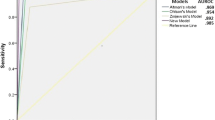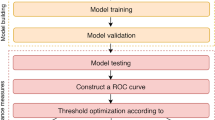Abstract
This paper provides a methodological analysis of credit risk in manufacturing firms. By using a representative sample of both healthy and bankrupted firms during the period 2003–2009 we provide an in-depth comparison of the standard discriminant approach for bankruptcy prediction based on a logistic regression model and a Robust Bayesian Approach. We conclude that the use of a robust GLM regression methodology enables us to provide a more accurate separation between sound and unsound firms thus suggesting that this methodological framework may be used to achieve a more reliable measure of firms credit worthiness.
Access this chapter
Tax calculation will be finalised at checkout
Purchases are for personal use only
Similar content being viewed by others
Notes
- 1.
Regression results available on request.
- 2.
Our results, available on request, show that if a cutoff point of 0.02 is fixed, a Type II Error of 0.5 is obtained with the 2003 model (84 % of bankruptcy cases correctly predicted). However, as at this cutoff point we also wrongly classify as unsound 16 % of healthy firms, we prefer to accept a small increase in Type I Error in order to reach a better classification for the group of healthy firms. Thus, a cutoff point of 0.04 seems to be a reasonable compromise (74 % of bankruptcy cases correctly predicted and 90 % of sound firms correctly classified).
References
Altman, E.I.: Financial ratios, discriminant analysis and the prediction of corporate bankruptcy. J. Finance 23(4), 589–609 (1968)
Altman, E.I., Haldeman, R.G., Narayanan P.: A new model to identify bankruptcy risk of corporation. J. Bank. Finance 1(1), 29–54 (1977)
Atkinson, A.C., Riani, M.: Forward search added variable t tests and the effect of masked outliers on model selection. Biometrika 89, 939–946 (2002)
Bartoloni, E., Baussola, M.: Financial performance in manufacturing firms: a comparison between parametric and non-parametric approaches. Bus. Econ. 49(1), 32–45 (2014)
Deakin, E.B.: A discriminant analysis of predictors of business failure. J. Acc. Res. 10(1), 167–179 (1972)
Hall, B.: The financing of research and development. Oxf. Rev. Econ. Policy 18, 35–51 (2002)
Kaplan, S.N., Zingales, L.: Do financing constraints explain why investment is correlated with cash flows. Q. J. Econ. 112(1), 169–215 (1997)
Marin, J.-M., Pudlo, P., Robert, C.P., Ryder, R.: Approximate Bayesian computational methods. Stat. Comput. 22(1), 1167–1180 (2012)
Ohlson J.A.: Financial ratios and the probabilistic prediction of bankruptcy. J. Acc. Res. 18(1), 109–131 (1980)
Author information
Authors and Affiliations
Corresponding author
Editor information
Editors and Affiliations
Rights and permissions
Copyright information
© 2014 Springer-Verlag Berlin Heidelberg
About this chapter
Cite this chapter
Baussola, M., Bartoloni, E., Corbellini, A. (2014). Business Failure Prediction in Manufacturing: A Robust Bayesian Approach to Discriminant Scoring. In: Carpita, M., Brentari, E., Qannari, E. (eds) Advances in Latent Variables. Studies in Theoretical and Applied Statistics(). Springer, Cham. https://doi.org/10.1007/10104_2014_8
Download citation
DOI: https://doi.org/10.1007/10104_2014_8
Published:
Publisher Name: Springer, Cham
Print ISBN: 978-3-319-02966-5
Online ISBN: 978-3-319-02967-2
eBook Packages: Mathematics and StatisticsMathematics and Statistics (R0)




